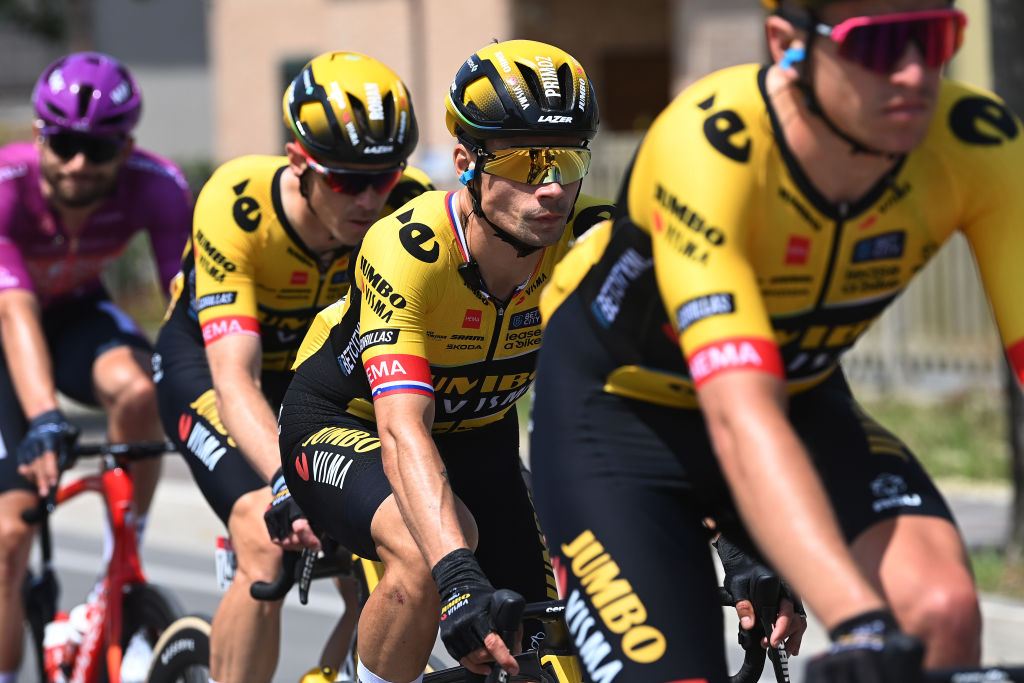Early deficit ‘doesn’t change’ Roglic and Jumbo-Visma’s approach to Giro d’Italia
‘There’s nothing wrong, Primoz’s values were good in opening time trial’ says sports director

Addy Engels must have spent most of the countdown to the Giro d’Italia phoning up his riders and asking them to change their plans for May. A combination of COVID-19 and crashes meant that Jumbo-Visma had to substitute no fewer than four of their line-up for the corsa rosa in the four days before the race started.
“I never experienced it myself and to be honest, I never experienced it with any other team, as far as I can remember,” said Engels, a sports director for Jumbo-Visma, in Teramo on Sunday morning. “That was a novelty for me, and one I hope I never have to repeat. But there’s no guarantee. Many people might say we’ve already had our portion of bad luck. Statistically, yes, but there’s no guarantee.”
Whether it was down to the laws of probability or sound positioning, Jumbo-Visma mercifully avoided misfortune on stage 2 to San Salvo, as Primož Roglič avoided the crash that split the bunch with 3.8km to go, coming home safely in the front group alongside maglia rosa Remco Evenepoel (Soudal-QuickStep).
Tao Geoghegan Hart (Ineos Grenadiers) was among the riders held up, losing 19 seconds, and so Roglič gained a place in the overall standings to move into fifth, though his deficit to Evenepoel remains 43 seconds after the Belgian’s supersonic display in Saturday’s opening time trial.
Roglič and Evenepoel were the consensus favourites for this Giro from the moment they confirmed their participation, and the pair marked one another tightly at March’s Volta a Catalunya, with the Slovenian edging the decision by six seconds.
There were no time trials in that race, however, and Evenepoel availed of the Giro’s opening test in Ortona to force significant separation from Roglič. Evenepoel had already handed Roglič a sound beating in the Alicante time trial at last year’s Vuelta a España, but in Spain, his time gain came at a rare 1.55 seconds per kilometre. Here, Roglič lost 2.19 seconds per kilometre to Evenepoel.
“Primož did a good time trial, his values were good. And we have to say Remco did an outstanding time trial and the gaps were big at the finish,” Engels said, though he declined to describe the early gap as a surprise.
The latest race content, interviews, features, reviews and expert buying guides, direct to your inbox!
“What is a surprise? We all know he’s an exceptional rider. I think the gaps were pretty big between first and second for a TT like this, but then again, we try to take the positive things. Like Primož said, his gap to Filipp Ganna was smaller than at Tirreno-Adriatico and his values were good. That’s the most important thing for us. There’s nothing wrong, his values were good. We can be confident for him for what’s coming up.”
With another 35km time trial to Cesena to come on stage 9, however, Evenepoel has another clear opportunity to add to his buffer over Roglič et al in the opening stanza of this buffer. Even allowing for all the usual caveats, it seems that Evenepoel is, at this moment, on another plane to his rivals against the watch, though Engels warned against projecting forward to next Sunday.
“The result of yesterday’s TT is no guarantee for results in the TT one week later,” said Engels, who added that the early deficit had not changed Jumbo-Visma’s approach to the Giro. He didn’t say it explicitly, but one senses Roglič may have been braced for a damage limitation exercise against the watch after his defeat in Alicante on last year’s Vuelta.
“We knew of course it would be possible to lose some time in the TT,” Engels said. “But I think the opportunities that were there before yesterday are still there. That doesn’t change.”
It already seems likely, however, that Roglič will not be able to rely solely on his ability to outkick Evenepoel in the closing metres of hilltop finales and pick off bonus seconds. A degree of invention akin to his long-range attack at Lagos de Covadonga on the 2021 Vuelta a España might yet be required.
“The ideas that we have and might think of are in the road stages, where there might be opportunities – and where we might create opportunities,” said Engels, who will hope his radically redesigned team can feel its way into the Giro as the race progresses, with Sepp Kuss, Rohan Dennis and Sam Oomen set for key roles.
“It’s of course different, but then again, when you look to the guys we brought in, we have seven really good guys around Primož, so I still see a very strong team. Some guys might need a couple of days to get into the race or even get used to the idea, like Tom [Gloag], who arrived the night before the time trial. But there is time as well, and that’s good.”

Barry Ryan was Head of Features at Cyclingnews. He has covered professional cycling since 2010, reporting from the Tour de France, Giro d’Italia and events from Argentina to Japan. His writing has appeared in The Independent, Procycling and Cycling Plus. He is the author of The Ascent: Sean Kelly, Stephen Roche and the Rise of Irish Cycling’s Golden Generation, published by Gill Books.